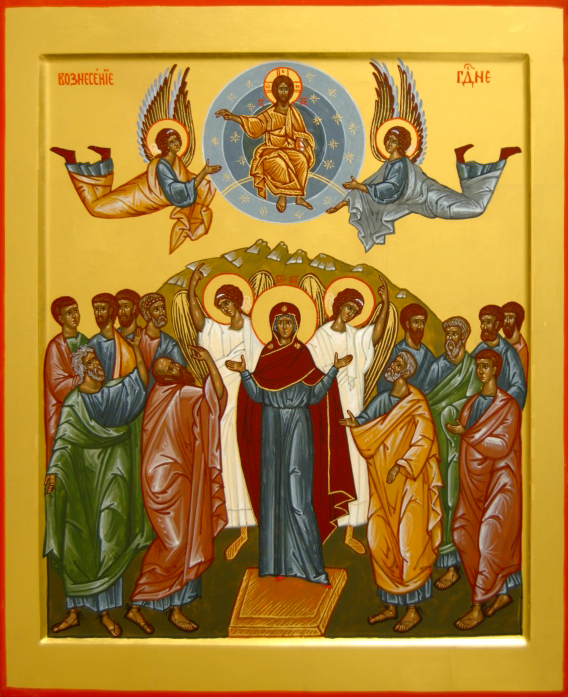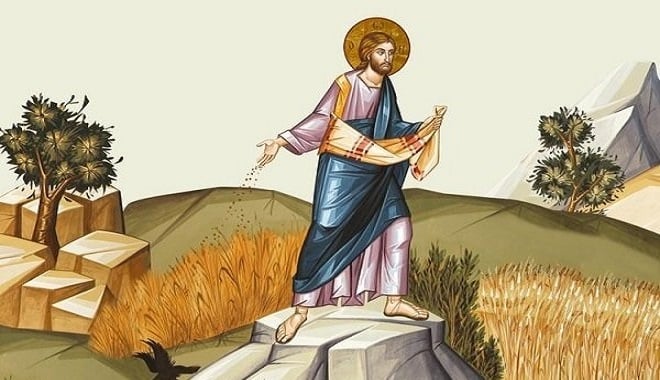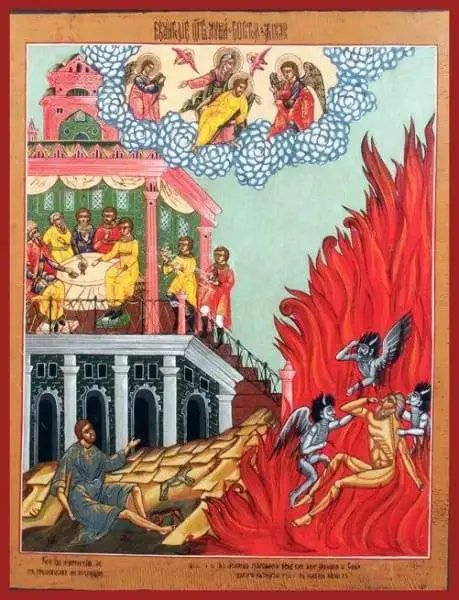
In the name of the ✠ Father, and of the ✠ Son, and of the ✠ Holy Spirit. Amen.
Friends in Christ,
Today we celebrate the Ascension of our Lord Jesus Christ, the moment when, forty days after His Resurrection, He was lifted before the eyes of His disciples and a cloud received Him from their sight. But rather than mourning, the disciples returned to Jerusalem with great joy. They had not been abandoned. They had been entrusted.
If you think about it, there’s something unsettling about watching someone you love walk away for the last time. That moment when they turn the corner, when the distance swallows them up, when you are left standing there wondering what comes next. The disciples knew this feeling. They watched Jesus rise until a cloud took Him from their sight. And yet Luke tells us they returned to Jerusalem “with great joy.”
The Feast of the Ascension is not a poetic farewell. It is not the story of Christ departing the world in triumph while we struggle behind. It is the unveiling of a new beginning. It is a moment that speaks to the very heart of what it means to be human and what it means to belong to the Church. It affirms that our life, our body, our vocation, and even the created world are not forgotten, but glorified.
To understand what that trust and joy felt like for the disciples, consider this.
There was a father and son in a small rural town in New South Wales. The father was a skilled mechanic. He ran a modest but well-respected auto shop behind their home. Over the years, his teenage son began helping out. At first, he made mistakes, spilling oil or dropping tools, but his father never shouted. He simply kept teaching him one job at a time.
Gradually, the boy grew in skill and confidence. He began taking on small repairs on his own. His father started stepping back, not out of indifference, but out of trust.
Then came the day the father received an offer to teach at a TAFE in Sydney. He called his son aside and said, “I need to go, and I want you to run the shop.”
The boy said quietly, “I’m not ready.” But the father looked at him and replied, “You are. You’ve watched me. You’ve worked beside me. You’ve learned more than you know. And I’ll always be just a call away.”
The morning after his father left, the boy opened the workshop. He rolled up the shutters, looked around at the tools he used to fear, and got to work. He did not feel abandoned. He felt entrusted. The trust of his father became his strength.
So it was with the disciples. The Lord had taught them how to forgive, how to serve, how to pray, how to bless, how to bear suffering. He had opened the Scriptures and broken bread with them. Now, He ascended. But it was not to disappear. It was to hand over the work of His Kingdom to those He had trained in love.
In the face of war, displacement, and exploitation, the Ascension reminds us of the dignity of every human person. When we see refugee children sleeping on cardboard in Gaza or Sudan, when we witness elderly men and women dying without dignity in underfunded care homes, this feast compels us to look heavenward not in escape, but in protest. Christ has taken our human nature into the very life of God. As St Gregory of Nyssa taught, what is not assumed is not healed. Christ has assumed not only our soul but our skin, our bones, our frailty. He has lifted human nature to the throne of heaven. That means every act of violence or cruelty is not simply evil. It is a direct contradiction of what God has done in the Ascension.
It is no coincidence that this same feast places the future of the Church in the hands of the apostles. Christ does not linger. He blesses, He entrusts, and He departs. As St John Chrysostom said, He leaves behind His own ministers as heads and eyes to the body. This is not absence. It is appointment. In a time when trust in institutions is collapsing, when churches are reeling from scandal or division, we might be tempted to think the Lord has stepped away in disappointment. But the Ascension tells us something else. He has not abandoned the Church. He has trusted it. He has trusted us. We are not spectators of holiness. We are its stewards.
This trust is not comfortable. It is a calling. While many are turning away from the Church in the West, this feast is not a nostalgic glance at a golden age. It is an invitation to build from within. To be faithful, present, and prayerful even when the Church appears wounded. It reminds us that the Body of Christ still walks the earth, and its hands are ours.
And what of the world itself? In these days we are increasingly anxious about our planet. The skies are hotter. The seas are rising. Forests burn, and young people despair. In the midst of this fear, the Ascension offers a defiant hope. Christ does not rise from the earth to discard it. He rises through it, with it, and for it. As St Maximus the Confessor understood, Christ is the cosmic reconciler. He binds heaven and earth, soul and body, matter and spirit. The world is not disposable. It is destined for transfiguration.
When we see oceans choked with plastic and forests burned to ash, the Ascension reminds us that creation is not being discarded. It is being drawn toward fulfilment. This is not wishful thinking. It is theology with soil beneath its feet. It says that history is going somewhere. Not into ruin, but into the Kingdom.
This feast also teaches us what real kingship looks like. We live in a world where power is flaunted. Nations rattle their weapons. Politicians speak of strength with clenched fists. Sometimes, religious language is hijacked by political agendas and the Gospel is entirely forgotten. Leaders present themselves as saviours, as if earthly power can bring divine peace. But the Ascension reframes everything. The Church sings that God has gone up with a shout, the Lord with the sound of the trumpet. Yet this is not the shout of conquest. It is the cry of the Crucified. The Ascended Lord still bears His wounds. His throne is not like Caesar’s. It is the Cross. When we confess Christ as King, we are not aligning with worldly victory. We are choosing cruciform love.
The angels who stood beside the disciples said, “Why do you stand looking into heaven?” It is a gentle rebuke. Do not stand still. Do not drift into nostalgia. The Church is not a museum for sacred memories. It is a living Body, called to move, to heal, to speak truth, to serve the world as Christ did.
And how do we do this in a world now saturated by screens, by artificial intelligence, by relationships filtered through algorithms? The Ascension answers this too. Christ is no longer visible in the flesh, but He is truly present. Not digitally. Not virtually. But sacramentally. The Spirit cannot be downloaded. The Eucharist cannot be streamed. Faith is not a broadcast. It is embodied.
In a time of epidemic loneliness and shallow connection, the Ascension calls us to real presence. Christ touched the leper. He broke bread. He called people by name. And though He now reigns from the heavens, He is closer to us than ever. The Church must offer not more content but more communion. Not more spectacle but more presence.
So let us stand with the apostles. Let us lift our eyes not to escape the world, but to recognise where it is going. Let us go back into the city, into the world, not afraid, but entrusted.
The Lord has gone ahead. The Spirit is coming. The mission continues.
To Him who ascended in glory and fills all things be glory and honour, now and forever and unto the ages of ages. Amen. ✠
Copyright © 2025 The Rev. Adrian Augustus. The Russian Orthodox Church of the Archangel Michael, Blacktown, NSW


